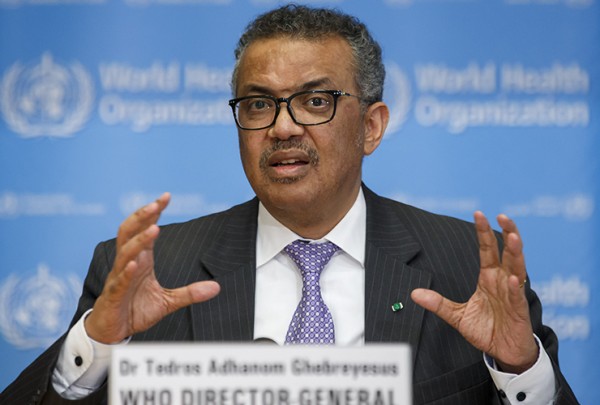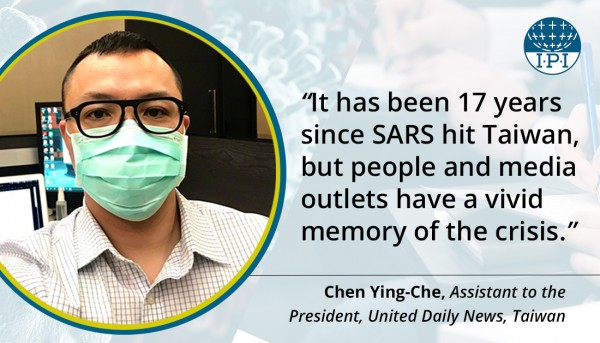The International Press Institute (IPI), a global network of editors, media executives and leading journalists for press freedom, today called on the World Health Organization (WHO) to grant accreditation to Taiwanese journalists.
Journalists from Taiwan (Republic of China) have been denied accreditation by the WHO for the past six years. As a result, Taiwanese media outlets have no access to the World Health Assembly and briefings by the WHO.
In a letter to WHO Director General Dr. Tedros Adhanom Ghebreyesus, IPI Executive Director Barbara Trionfi said the accreditation block hindered the flow of information on the coronavirus pandemic.
Trionfi noted that journalists in Taiwan have been able to draw on their experience during the SARS epidemic to implement, from day one of the COVID-19 pandemic, protocols and editorial policies that ensure the dissemination of valuable news while protecting journalists’ safety. Their experience is immensely valuable to the global community represented by the WHO.
“Health and the right to information transcend political and geographical boundaries”, Trionfi said. “We believe that by refusing accreditation to Taiwanese journalists and denying access to information to the people of Taiwan, the WHO is not just violating its founding principles but also undermining UN Sustainable Development Goal 3 on ensuring healthy lives and promoting well-being for all at all ages.”
Read the full text of the letter.
Dr. Tedros Adhanom Ghebreyesus
Director General
World Health Organization
9 April 2020 Accreditation for Taiwan journalists
Honourable Dr. Ghebreyesus,
On behalf of the members of the International Press Institute (IPI), a global network of editors, media executives and leading journalists for press freedom, I would like to express our gratitude to you and the staff of the World Health Organization for your efforts in dealing with the ongoing Covid-19 pandemic.
In these times of crisis, the public needs news that it can trust. It is critical at this stage that more support is provided to independent media, which are crucial allies in the fight against COVID-19.
The World Health Organization has been conveying its key messages and concerns relating to COVID-19 to governments and the people through frequent media briefings. We appreciate that the WHO understands and values the importance of the media’s role not only in crisis situations like the current pandemic, but also in promoting good health practices, and has a communications team to interact with journalists.
However, we are extremely concerned that journalists from Taiwan (Republic of China), where the government has done a commendable job in containing COVID-19 infections, have been shut out of the WHO. For the past six years, journalists working for Taiwanese media outlets have been denied accreditation to cover the World Health Assembly.
This is even more disturbing today, as journalists in Taiwan have been able to draw on their experience during the SARS epidemic to implement, from day one of the COVID-19 epidemic, protocols and editorial policies that ensure the dissemination of valuable news while protecting journalists’ safety. Their experience is immensely valuable to the global community represented by the WHO.
We welcome your statement that COVID-19 should not be politicized, and we expect that the WHO will implement this in both letter and spirit by granting accreditation to journalists from Taiwan and allowing them to fully participate in WHO activities, thereby delivering valuable lessons learnt from Taiwan.
Health and the right to information transcend political and geographical boundaries. The Constitution of the World Health Organization states: “The enjoyment of the highest attainable standard of health is one of the fundamental rights of every human being without distinction of race, religion, political belief, economic or social condition”. It also states that “the extension to all peoples of the benefits of medical, psychological and related knowledge is essential to the fullest attainment of health”.
We believe that by refusing accreditation to Taiwanese journalists and denying access to information to the people of Taiwan, the WHO is not just violating its founding principles but also undermining UN Sustainable Development Goal 3 on ensuring healthy lives and promoting well-being for all at all ages.
We therefore urge the WHO to grant accreditation to journalists from Taiwan and those working for Taiwanese media outlets and uphold the rights of the people of Taiwan and the rest of the world to access information of public interest.
Yours sincerely,
Barbara Trionfi
Executive Director



